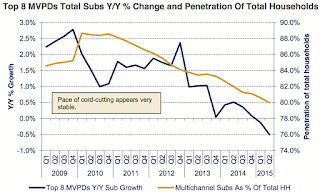According to a new Financial Times report, the second quarter of 2015 was the worst ever for pay-TV customer losses with 566,000 people abandoning their subscriptions.
Days before the news release, Cablevision Systems Corp. Chief Executive James Dolan told investors “I don't think the sky is falling quite yet.” He may be rethinking that.
“It’s clear that the millennial generation is having an impact, and every media company is trying to figure out how to connect with them,” said former DirecTV CEO Mike White.
Cord cutting has cost ESPN well north of 500k homes in the USA this year. Within two years, cable packages won't be necessary.
— Phillip Quinn (@PhilMQuinn) August 10, 2015
Meanwhile,
over-the-top (OTT) companies like Amazon and Netflix are basking in their
success.
Their services are recruiting top actors and celebrities to appear in
their highly lauded content.
"I think we’re
in a golden age of television, so if you go back in time even just five years, you
couldn’t get A-list talent to do TV serials, or, if you could, it was a rare
thing. But that’s flipped completely," Amazon CEO Jeff Bezos told
The Telegraph.
“The investment
is very high now in serialized TV, and the amount of time you have to tell a
story is much greater,” Bezos added. “That format change opens up a lot of storytelling possibilities, which, when mixed with the movie-like production standards,
and the A-list talent, is why we’re seeing amazing television.”
Then there’s Netflix, which is rescuing its users from watching over 130 hours of commercials every year – the equivalent of approximately five and a half days of nonstop advertising.
It’s no wonder
the service is popular.
Research firm
Pacific Crest recently published what Business Insider describes as the “scariest chart in the history of cable TV.” It reveals a steady decrease in pay-TV subscribers over the years.
Can cable
companies rally and regain their subscribers with new
options and bundles, or will OTT’s impact be deemed eternal?









Post a Comment